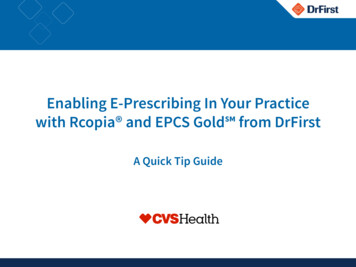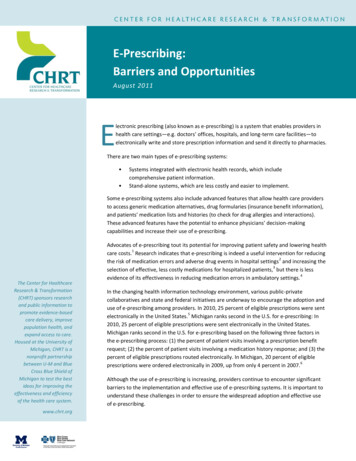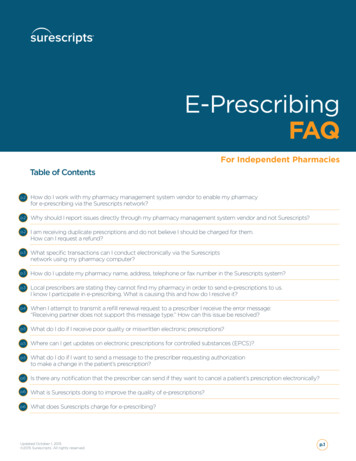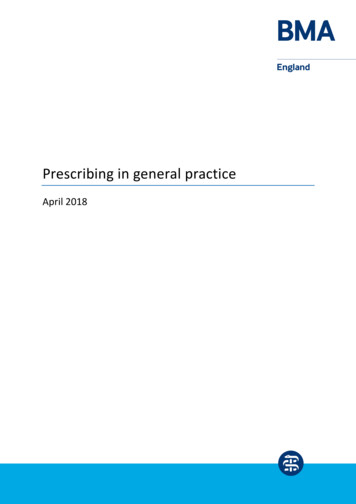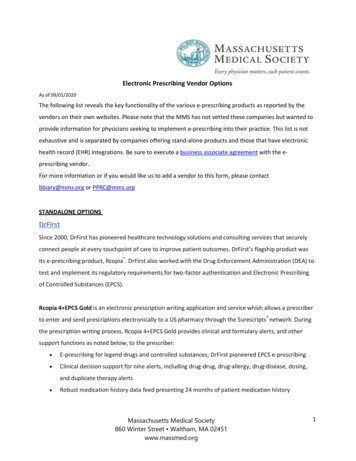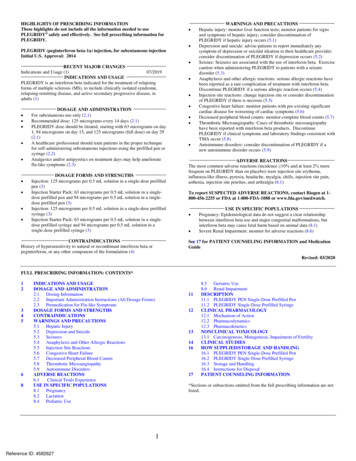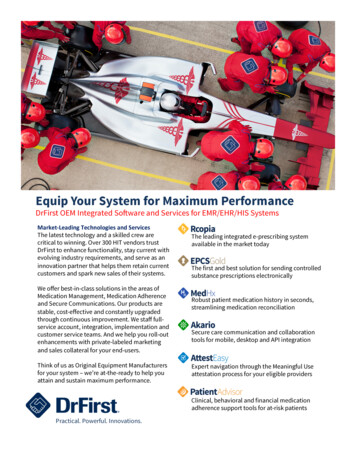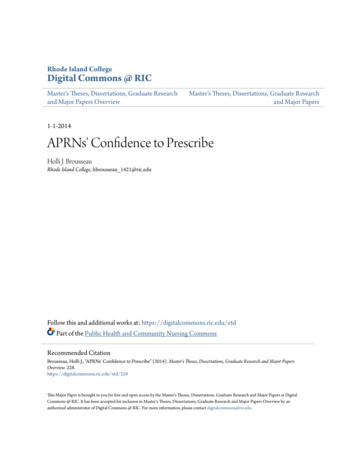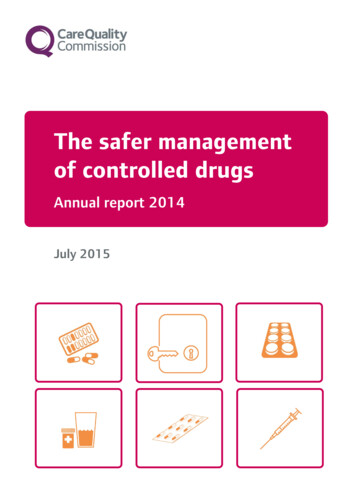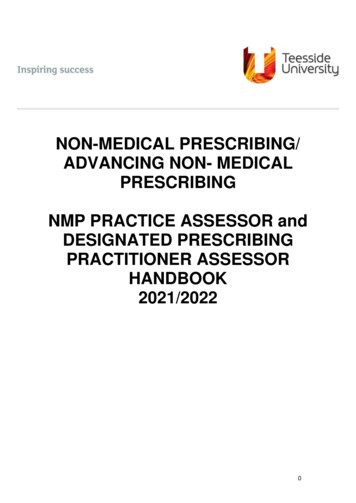
Transcription
NON-MEDICAL PRESCRIBING/ADVANCING NON- MEDICALPRESCRIBINGNMP PRACTICE ASSESSOR andDESIGNATED PRESCRIBINGPRACTITIONER ASSESSORHANDBOOK2021/20220
CONTENTSPage1INTRODUCTION12THE PROGRAMME TEAM13THE MODULES24MODULE AIMS AND OUTCOMES35THE MODULE STRUCTURE56RESPONSIBILITIES67HOW IT WILL WORK IN PRACTICE88GUIDELINES FOR COMPLETION OF THE PRACTICE PORTFOLIO89REFERENCES & READING11DISCLAIMERThe information contained in this handbook is, as far as possible, accurate and up-todate at the time of printing. The express permission of Teesside University must beobtained to reproduce any, or all of this publication, other than for personal use or forthose purposes permitted by law.1
1INTRODUCTIONWelcome to Teesside University, School of Health & Life Sciences. Thank you foragreeing to be a NMP Practice Assessor (PA) or Designated Prescribing Practitioner(DPP) Assessor. This handbook is designed to provide you with the information youwill require to facilitate your allocated student studying either the modules Non-medicalPrescribing at level 6 or Advancing Non-medical Prescribing at level 7.The role of the PA and DPP is essential for the successful implementation of theeducational programme leading to the professional qualification to prescribe. It isrecognised that competence in practice is achieved by supported exposure to practicallearning experiences and that reflective dialogue will help ensure that theoreticalconcepts are used to support decision-making. It is therefore the responsibility of youas the PA or DPP to make a judgement upon the student's competence to practise asa non-medical prescriber. Registrants who will be prescribing for children and youngpeople must be supervised by a PA or DPP who is experienced and competent inprescribing for children.To further support you and to provide more detailed information on the programmeplease take a look at our Practice Support website. This will not only provide furtherinformation on the programme but also additional information about the support forclinical colleagues who provide support for students across the School of Health & LifeSciences. There is a range of programmes on the site the Non-Medical Prescribinglink can be found on the left of the website and is clearly pport2THE PROGRAMME TEAMDebbie Osborne is the programme lead. She is based in room H1.31 of the CenturiaBuilding at Teesside University and can be contacted by telephone on 01642 738257or by email at D.Osborne@tees.ac.uk .She is responsible for the planning, coordination and evaluation of the modules. You should direct any questions, queries,or concerns to Debbie in the first instance.Shareen Penny supports the programme and can also be contacted. She is based inroom H1.31 in the Centuria Building, email s.penny@tees.ac.ukRosie Dawson is the Lead Midwife for Education (LME) and supports midwives whoundertake the module. She can be contacted by email R.Dawson@tees.ac.uk1
3THE MODULESNon-medical Prescribing and Advancing Non-medical Prescribing (NMP) have beendesigned to support nurses, midwives and specialist community public health nurses,physiotherapists, radiographers, chiropodists/podiatrists, advanced practiceparamedics and dieticians to gain a non-medical prescribing qualification. Currentlythe programme has been successful in supporting nurses to achieve a Nursing andMidwifery Council (NMC) recordable independent and supplementary prescribingqualification. Since August 2013 physiotherapists and podiatrists have been able toprescribe on an independent and supplementary basis. Legislation has significantlychanged and in 2018 therapeutic radiographers and paramedics working in advancedpractice roles can now also train to prescribe on an independent basis. Dieticians anddiagnostic radiographers can prescribe on a supplementary basis; these allied healthprofessionals (AHPs) gain a recordable qualification with the Health & CareProfessions Council (HCPC).The professional requirement of 12 days in supervised practice supports thedevelopment of practitioners who can prescribe safely and effectively. For NMCregistrants (nurses or midwives) this equates to a minimum of 78 hours forAHPs this is 90 hours.Independent prescribing is becoming a widely integrated feature of health servicedelivery, with nurses, physiotherapists, podiatrists, radiographers, dieticians andparamedics qualified to prescribe in nearly all Trusts in England. Paramedics must beworking in advanced practice roles and for organisations who have the governancearrangements in place to support prescribing practice. Currently this includes NHStrust or GP employers only. This supports the achievement of ambitions set out inEquity and Excellence: Liberating the NHS (Department of Health (DH) 2010A). Twoto three per cent of the nursing workforce are qualified independent prescribers andare prescribing predominantly in primary care, with substantial numbers also insecondary care settings. As mentioned above to further empower AHPs to deliverimproved clinical outcomes physiotherapists and podiatrists have from August 2013had their supplementary prescribing rights extended to independent prescribing.Further to this in April 2016 therapeutic radiographers gained independent prescribingrights and dieticians supplementary prescribing rights; paramedics gainedindependent prescribing rights in Spring 2018. Nurses, physiotherapists, podiatristsand paramedics will also gain supplementary prescribing, diagnostic radiographerswill continue to be able to train as supplementary prescribers and prescribe within aClinical Management Plan (CMP).Supplementary Prescribing legislation in 2005 initially prepared health professionalsto expand their roles. Nurses have trained as independent prescribers since 2006 andthe expansion of independent prescribing by physiotherapists and podiatrists supportsenhanced patient-centred care. New roles and new ways of working to improve qualityof services, deliver safe, effective services focused on the patient experience havebeen developed across inter-professional working within health care. Non-medicalprescribing has facilitated partnership working across professional and organisationalboundaries and within the commissioning and provider arena. The benefits of nonmedical prescribing to patients with a wide range of conditions have ensured thatchoice and faster access to medicines are a realistic service improvement (DH,2
2010b). Throughout the module the students will be on a journey looking at thedevelopment of prescribing knowledge and skills including the consultation andprescribing governance (Royal Pharmaceutical Society, 2016). The RPS CompetencyFramework for all Prescribers is fully embedded into the programme includingassessment in accordance with the NMC Standards for Prescribing programmes(NMC 2018)Modules are delivered at academic Level 6 (degree) and Level 7 (masters). Yourstudent will inform you which module they are studying. Both modules aims andoutcomes are detailed below.4MODULE AIMS AND OUTCOMESNon-Medical Prescribing (Level 6- Degree)Module AimsThe aims of the module are to: To facilitate the development of knowledge and skills required by professionalsto prescribe as independent prescribers and/or supplementary prescribers.Enable students to apply knowledge to clinical practice demonstrating the abilityto prescribe safely and effectively in order to meet prescribing standards set bythe Nursing and Midwifery Council/Health & Care Professions Council.Module OutcomesOn completion of this module students will be able to: Synthesise and critically appraise the legal and professional framework foraccountability and responsibility in relation to prescribing practice.Demonstrate a comprehensive and detailed knowledge of drug actions inprescribing practice (pharmacodynamics and pharmacokinetics).Synthesise and critically appraise the factors impacting upon and influencingsafe and ethical prescribing practice.Synthesise and evaluate relevant evidence, sources of information anddecision support systems to inform prescribing practice.Demonstrate achievement of the Regulatory Bodies’ standards of proficiencyas applied for independent and supplementary prescribing.Act autonomously whilst recognising the contributions of the multidisciplinaryteam involved in prescribing, supplying and administering medicines.Demonstrate a comprehensive and detailed knowledge of the clinical decisionmaking strategies which underpin autonomous prescribing practice in effectivecommunication, consultation/assessment, diagnosis and treatment, which caninclude over the counter, alternative and complementary health therapies.Demonstrate a comprehensive and detailed knowledge of the skills required toprescribe safely, appropriately and cost effectively taking into account individualchoice and wishes.3
Practice within a framework of clinical governance, professional accountabilityand responsibility.Develop and document a Clinical Management Plan within legislativerequirements and within the context of a prescribing partnership.Demonstrate the ability to monitor response to medicines and modify treatmentor refer as appropriate.Demonstrate a comprehensive and detailed knowledge of the importance ofrecord-keeping in the context of medicines management including: accuraterecording in patient notes, reporting of near misses, adverse reactions, abilityto access patient records and clinical management plans.When working with children and young people take an appropriate history,undertake a clinical assessment, and make an appropriate diagnosis, havingconsidered the legal, cognitive, emotional and physical differences betweenchildren and adults.Recognise and respond to potential risks associated with prescribing ofunlicensed medicines.Select, evaluate and apply appropriate numeracy skills commensurate with thedemands of ensuring safe prescribing practice.Demonstrate a critical reflective approach to continuing professionaldevelopment.The practice outcomes are detailed in Appendix 1.Advancing Non-medical Prescribing (Level 7 - Masters)Module AimsThe aims of the module are to: To facilitate the development of knowledge and skills required by professionalsto prescribe as independent prescribers and/or supplementary prescribers.Enable students to apply knowledge to clinical practice demonstrating the abilityto prescribe safely and effectively in order to meet prescribing standards set bythe Nursing and Midwifery Council/Health & Care Professions Council.To develop the critical thinking and decision-making skills to support the needto influence the delivery of improvements in prescribing practice.Module OutcomesOn completion of this module students will be able to: Demonstrate a comprehensive and critical understanding of the legal andprofessional framework for accountability and responsibility in relation toprescribing practice.Demonstrate a systematic and critical understanding of drug actions inprescribing practice (pharmacodynamics and pharmacokinetics).Demonstrate a systematic and critical understanding of the factors impactingupon and influencing safe and ethical prescribing practice.Demonstrate a systematic and critical understanding of the breadth and depthof knowledge of non-medical prescribing in order to have a critical awarenessof the need to identify and deliver service improvement in professional practice4
Integrate and synthesise diverse knowledge, evidence, concepts, theory andpractice which inform prescribing practice and promote understanding and/orgood practice and solve foreseen and unforeseen problems.Challenge orthodoxy and formulate new/alternative hypotheses or solutionsrelated to prescribing practice.Demonstrate achievement of the regulatory bodies’ standards of proficiency asapplied for independent and supplementary prescribing.Demonstrate the ability to manage the implications of ethical dilemmas whilstrecognising the contributions of the multidisciplinary team involved inprescribing, supplying and administering medicines.Demonstrate a systematic and critical understanding of the clinical decisionmaking strategies which underpin autonomous prescribing practice in effectivecommunication, consultation/assessment, diagnosis and treatment, which caninclude over the counter, alternatives and complementary health therapies.Demonstrate a comprehensive and critical understanding of the skills requiredto prescribe safely, appropriately and cost effectively taking into accountindividual choice and wishes.Operate ethically within a framework of clinical governance, and have a criticalunderstanding of the issues governing professional accountability andresponsibility.Develop and document a Clinical Management Plan within legislativerequirements and within the context of a prescribing partnership.Demonstrate the ability to monitor response to medicines and modify treatmentor refer as appropriate.Demonstrate a systematic and critical understanding of the importance ofrecord-keeping in the context of medicines management including: accuraterecording in patient notes, reporting of near misses, adverse reactions, abilityto access patient records and clinical management plans.When working with children and young people take an appropriate history,undertake a clinical assessment, and make an appropriate diagnosis, havingconsidered the legal, cognitive, emotional and physical differences betweenchildren and adults.Act autonomously in implementing a response to potential risks associated withprescribing of unlicensed medicines.Collaborate effectively with independent prescribers, the wider multidisciplinaryteams and organisations to influence and enhance prescribing practice.Competent in the numeracy skills commensurate with the demands of researchand scholarship in ways appropriate to prescribing practice.Demonstrate the independent learning ability required for continuingprofessional development.The practice outcomes are detailed in Appendix 2.5
5THE MODULE STRUCTURESYour students are required to complete 12 supervised practice days with you(minimum 78 hours for nurses, 90 hours for AHP’s). It will be necessary to ensurethat you and your student are able to work together for sufficient time for youto be able to confidently assess that they have met the practice outcomes. It isexpected and very useful that a programme of experience will allow the student towork with other team members who can prescribe in order to experience a variety oflearning opportunities. You must be the person responsible for assessing andverifying that they have met the practice outcomes.Students will have 24 theoretical days which will include taught days in the Universityand self-directed study.6RESPONSIBILITIESThe Nominated PersonThe Nominated Person is a named individual for each ward/department area. TheNominated Person will be nominated by the ward/department manager as appropriatefor the role. The role of the Nominated Person is to provide a link between theward/department, the University and the Practice Placement Facilitator. They willcomplete the education audit with the university representative and will overseedevelopment of the placement information/education resources. The NominatedPerson has a knowledge of the Practice Assessors and Practice Supervisors currentin their practice area. They understand the course and support infrastructure withinthe practice environment and University setting. The nominated person is the firstpoint of contact for students and offer support and advice for students who haveconcerns.The Nominated Person will ensure that students have had an induction to the area,have been allocated off duty prior to the start of the placement and have access to thelearning resources available and have been allocated to a Practice Assessor and theirPractice Learning Team/Practice Supervisors as appropriate. The Nominated Personwill ensure that students have had an induction to the area and have access to thelearning resources available. The Nominated Person, in liaison with the PracticeLearning Team will make students aware of the support and opportunities available tothem within the learning environments, thereby ensuring that students are empoweredto be proactive and to take responsibility for their learning.Practice Supervisor Is a Registrant with the relevant qualification in prescribingEstablishing a Learning Contract identifying objectives for the period ofsupervision.Documenting progress of supervision on the Practice Supervisor Feedbackform.Facilitating learning by encouraging critical thinking and reflection.6
Supervising students as they carry out consultations and suggest clinicalmanagement and prescribing options, which are then discussed with thePractice Assessor.Taking opportunities to allow in-depth discussion and analysis of clinicalmanagement using a random case analysis approach, when patient/client careand prescribing behaviour can be examined further.Facilitating, observing, and reporting performance over the period of supervisedpractice.Facilitating the opportunity to gain service user/carer feedback using thepractice-based 360 interpersonal skills assessment tool (one fully completedassessed tool).Identify and document any ‘cause for concern’, e.g. concerns regardingcompetence acquisition, or conduct, or unsafe practice, and discuss at theearliest possible stage with the Practice Assessor and programme team.Ensuring regular feedback to the Practice Assessor through the provision ofPractice Supervisor Feedback forms.As NMP Practice Assessor or DPP is responsible for: Establishing a Learning Contract in partnership with you.Documenting progress on three occasions during supervised practice andproviding any additional opportunities if required to achieve outcomes in atimely manner.Planning a learning programme which will provide the opportunity for you tomeet your learning objectives and gain competency in prescribing.Facilitating learning by encouraging your critical thinking and reflection.Providing dedicated time and opportunities for you to observe how you conducta consultation/interview with patient/clients and/or parents/carers and thedevelopment of a management plan.Allowing opportunities for you to carry out consultations and suggest clinicalmanagement and prescribing options, which are then discussed with you.Helping ensure that you integrate theory with practice.Taking opportunities to allow in-depth discussion and analysis of clinicalmanagement using a random case analysis approach, when patient/client careand prescribing behaviour can be examined further.Facilitating, observing, and assessing your performance over the continuousperiod of supervised practice.Ensuring feedback from other prescribing practitioners and supervisors whofacilitate learning experiences.Facilitate the opportunity to complete three episode of care and prescriptionwriting.Facilitating the opportunity to gain service user/carer feedback using thepractice-based, 360 interpersonal skills assessment tool (one fully completedassessed tool with three episodes of service user or carer feedback). Thisshould be completed alongside the episodes of care.Facilitate the opportunity to complete the SCEP’s in practice at a formative andsummative level.7
Assessing and verifying that, by the end of the module, you are competent toassume the prescribing role. It is the NMP Practice Assessor or DPP’sresponsibility to decide whether you are making satisfactory progress towardsmeeting your practice outcomes for non-medical prescribing. This decision willbe based upon whether the practice outcomes have been met. If during thepractice days, the student is deemed by the NMP Practice Assessor or DPP tobe failing to make sufficient progress towards achievement of these outcomesyou should inform both student and a member of the programme team toconsider if strategies can be put in place to support you. Working in collaboration with LME to support midwife students. Identify and document any cause for concern, for example concerns regardingcompetence acquisition, or conduct, or unsafe practice, and discuss at theearliest possible stage with the programme team. Unsafe practice can forexample include repeated episodes of making an incorrect diagnosis,recommending incorrect treatment options or incorrect completion ofprescriptions. A cause for concern form should be completed. If your studentdemonstrate any concern relating to patient safety you should be aware thatthe SOHLS consider the Fitness to Practise process. Details of this processcan be found in your SOHLS Student Essential Guide. Reconfirming and verifying competence has been maintained should thestudent interrupt, require reassessment or delay your studies.The contribution of the NMP Practice Assessor in relation to providing supervision,support, and opportunities to develop competence in practice is therefore crucial. Thecriteria for fulfilling this role is dictated by the Nursing and Midwifery Council Standardsfor Prescribing programmes (2018) The NMP Practice Assessor must be a registered healthcare professional Be an experienced active prescriber with suitable equivalent qualifications forthis Non Medical Prescribing programme and at least 3 years experience.The contribution of the DPP in relation to providing you with supervision, support, andopportunities to develop competence in practice is therefore crucial. The criteria forfulfilling this role is dictated by the Department of Health and are that the DPP: Has normally had at least three years’ recent clinical experience for a group ofpatient/clients in the relevant field of practice.Works within a GP practice and is either vocationally trained or in possessionof a certificate of equivalent experience from the Joint Committee forPostgraduate Training in General Practice Certificate or is a specialist registrar,clinical assistant or a consultant within a NHS Trust or other NHS employer.Has the support of the employing organisation or GP practice to act as the DPPwho will provide supervision, support and opportunities to develop competencein prescribing practice.Has some experience or training in teaching and/or supervising in practice.Normally works with the student prescriber. If this is not possible (such as innurse-led services or community pharmacy), arrangements can be agreed foranother doctor to take on the role of the DPP, provided the above criteria aremet and the learning in practice relates to the clinical area in which the studentprescriber will ultimately be carrying out their prescribing role.8
Examples of SupervisionYour contribution in relation to providing supervision, support and opportunities todevelop competence in practice is crucial. Dedicated time and opportunities for your student to observe how you conducta "consultation/interview" with patients and/or their carers, and the developmentof a subsequent management plan.Opportunities to allow in-depth discussion and analysis of clinical managementusing a random case analysis approach, when patient care and prescribingbehaviour can be examined further.Facilitate student learning by encouraging critical thinking and reflection withthe use of their Practice Portfolio or Learning Logs.Allow opportunities for your student to carry out consultations and suggestclinical management and prescribing options, which are then discussed withyou.Academic AssessorThe Academic Assessor is a member of the teaching staff at the University, is aRegistered Nurse and has a relevant registration as a prescriber. The role of theAcademic Assessor is to offer objective, evidence-based decisions on conduct,proficiency and achievement and make recommendations for progression providingassurance of student achievements and competence. The Academic Assessor hasan understanding of the student’s learning and achievement in practice throughworking in partnership with the Practice Assessor to gather feedback regardingachievement and progression. The Academic Assessor in partnership with thePractice Assessor /DPP confirm the achievement of the student and eligibility forregistration as a prescriber with the NMC or HCPC with completion of the SummativeAssessment formThe StudentThe student’s role is to take responsibility for their own learning and demonstrate awillingness to develop both academically and in practice. They will be expected todiscuss their own learning needs with you and they should undertake honest selfassessment, articulate their learning needs, seek and accept formative feedback fromyou. Your student will need to recognise and appraise their own abilities andlimitations.Programme TeamDebbie Osborne as Programme Leader, has overall responsibility for both modulesand will provide general information related to the modules, guidance and supportwhere necessary. Debbie will be your first point of contact for any queries or concernsand provide academic and pastoral support or referral to central support services orother relevant staff where appropriate. Discipline-specific tutorials will be offered byspecialist Academic Assessors in order to enable students to identify individuallearning needs and to develop a Learning Contract to guide and facilitate academiclearning. The LME works with the module team and supports midwifery students ifyour student is a midwife you will be introduced to the LME at the Assessor preparationworkshop.9
It is recognised that the demands of the modules are challenging and that the intensityof the assessment is demanding. The module team will provide substantial support tostudents both in an academic and pastoral capacity. Students who require additionalsupport will be signposted to the most appropriate student support.7HOW IT WILL WORK IN PRACTICE Supervised learning in practice will comprise a total of 12 days of the student’stime (minimum 78 hours for nurses, 90 hours for AHP’s). You should bewilling and able to devote a sufficient part of your time during this period ofsupervision to provide appropriate guidance for your student.Learning in practice will be related to the medical conditions and circumstancesin which the student is likely to prescribe.The NMP Practice Assessor must be a registered healthcare professional andbe an experienced prescriber with 3 years suitable equivalent qualifications forthis Non Medical Prescribing programmeThe DPP may be a doctor with whom the student normally works. However,arrangements can be agreed where another suitable doctor acts as supervisor. 8GUIDELINES FOR COMPLETING THE PRACTICE PORTFOLIOYour student is required to use a Practice Portfolio as a framework through which toacquire and demonstrate competency. The purpose of the portfolio is to provide yourstudent with a framework through which they can record and demonstrate theirprogress and achievements whilst studying the modules. It will also provide you witha framework through which to monitor student progress and achievement of practiceoutcomes.The Practice PortfolioIn order to demonstrate achievement of the module outcomes, your student is requiredto keep a Practice Log. This should provide a documentary record illustrating thenature of individual learning. Included within this document is a complete list of all themodule outcomes as well as the practice outcomes. This will enable you to see thepractice element of the module within the context of the whole module.The portfolio-keeping process includes: Reflection upon existing knowledge and skillsExploration of the module outcomesIdentification of learning needsIdentification of learning opportunities in the practice areaMatching learning opportunities to learning needsDevelopment of a plan or Learning Contract to meet learning needs10
Implementation of the plan/Learning Contract and collection of supportingevidencePractice Supervisor Feedback FormsKeeping a Practice LogCritical reflection upon learning and achievement of practice module outcomesUndertaking a service user/carer assessment through feedback using the 360 interpersonal skills assessment tool (three user carers and one full assessedtool).Facilitate the opportunity to complete the SCEP’s in practice at a formative andsummative level.Presentation of the portfolio at the end of the moduleHow students will compile the portfolioStage 1 - Identifying Learning NeedsThe first step is to look at the practice outcomes and assess what your student needsto learn to achieve each one. You must set time aside at the beginning of the practiceplacement and review the practice outcomes, consider how these can be achievedand encourage your student to consider their own self-assessment and how learningneeds can be met. A Learning Contract will be developed to show how theseoutcomes can be achieved. This contract can also be used as a framework for thecritical reflection of learning. This meeting must be documented on the initial meetingform in Appendix 4. The Learning Contract template can be found in Appendix 5.Stage 2 - FeedbackYou must both set aside time to review progress and provide feedback on progress.This should be undertaken regularly and should involve discussing cases from practiceexperiences and reflecting upon and critically analysing. It is important that theoreticalconcepts are used to inform these discussions. This stage also includes assessmentof your student’s progress towards competence in relation to practice outcomes andyou must document this using the intermediate meeting form in Appendix 4. Serviceuser/carer feedback is required using the assessment tool (Appendix 8) and must bediscussed at the final meeting.Stage 3 – Verifying AchievementAt the end of the module, your student will submit their portfolio for verification of theaward. You must sign and date the practice outcomes have been met. Summa
registrants (nurses or midwives) this equates to a minimum of 78 hours for AHPs this is 90 hours. Independent prescribing is becoming a widely integrated feature of health service delivery, with nurses, physiotherapists, podiatrists, radiographers, dieticians and paramedics qualified to prescribe in nearly all Trusts in England.
